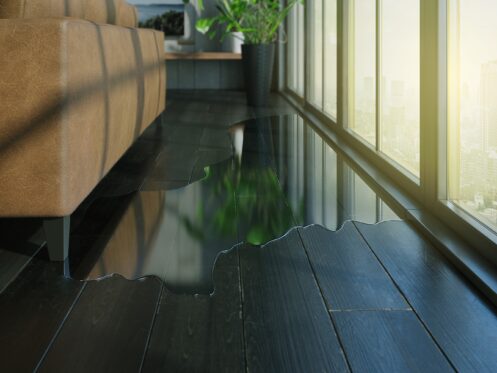If you’re a savvy homeowner who regularly assesses your utility bills to see where you can decrease costs, a rising water bill may worry you. If your routine usage hasn’t increased, hidden water leaks could be behind the increasing costs. Below, we’ll reveal some of our best tips for detecting hidden water leaks in your Denver, CO home.
The Dangers of Hidden Plumbing Leaks
When most people think about plumbing leaks, their main concern is an increase in their water bills. While this can be a downside of having leaks, it’s only one of many. Water can be extremely damaging to all different types of materials in your home. From your drywall and paint to your wood flooring and furniture, it can create permanent damage.
For example, if one of your water supply lines inside an interior wall is leaking, it can spill water into your drywall. The first sign of this problem you may notice is paint bubbling on your walls. At that point, your drywall will likely need to be replaced, which can be quite costly and intensive. High humidity can warp your wooden building materials and compromise the structural integrity of your home.
Apart from damaging building materials, water can also create too much condensation in your home. This can lead to unwanted mold and mildew growth, which can be toxic to your health. Unfortunately, you may not see this toxic mold until it’s out of control on the backside of all your walls and underneath your flooring. If you believe you have a plumbing leak in your home, you will need to identify its location and repair it swiftly to protect your home and health.
Monitor Your Water Meter
Your first stop when checking for a plumbing leak is at your water meter. First, turn off all water-using appliances in your home and ensure no one turns on any fixtures. Head outside to your water meter and take a look at the reading, noting the number you see. Wait about an hour, and then reassess the reading. Compare the two numbers. If the number has increased in the absence of using water in fixtures or appliances, you have a hidden plumbing leak somewhere in the home.
Evaluating the meter can be a great way to verify your suspicions of a plumbing leak.
Inspect Fixtures and Drains
Another place to start looking for plumbing leaks is your fixtures and drains. When it comes to your fixtures, look around the handles and spouts to see if there’s any water forming. Listen for any distinctive dripping noises that can indicate a leak. Examine the drain piping and water supply lines underneath your kitchen sink, bathroom sink, and even at your shower access panel. Run your hand along all these lines to check for any wetness. If there is, that is a key indication that you found the source of the leak. Shut off the water supply to that location and avoid using the drain if the leak is coming from that area until one of our plumbers can repair the issue. Water can cause an extensive amount of damage in just a short amount of time so you never want to let it continue unimpeded.
Look for Water Damage Signs
Wherever you find signs of water damage in your home, you will likely have a water leak. On your walls and ceilings, you might see bubbling paint, yellow stains or discolorations, and potential mold growth. Floors may develop damp spots or warping, especially near your bathrooms and appliances. The cabinets that surround your sink vanities may have water stains or feel damp to the touch.
Testing Toilets
Toilets can be a known source of plumbing leaks, which can be particularly tricky if the leak is happening from the toilet tank to the bowl. Your toilet might not have a visible problem, but if you suspect your toilet is leaking, add a few drops of vibrant food coloring to the toilet tank. Do not flush the toilet for about 10 or 15 minutes after adding the dye, and then reassess the color of the water in the toilet bowl. If the water in the bowl has developed a tint at all, even if only slightly, then your tank is leaking into the bowl and constantly using water.
This type of issue is commonly related to the flapper or tank valve, which one of our plumbing professionals can easily repair for you to quickly and efficiently stop the leak.
Use a Smart Leak Detection System
Smart leak detection systems are revolutionizing household plumbing systems and the average homeowner’s ability to quickly detect and stop unwanted leaks. This type of system uses multiple sensors you place under your sinks, by your appliances, near your water heater, and so forth.
Whenever the sensor detects water, your smart system will send an alert to your smartphone to let you know. Upgraded systems with built-in smart valves can shut off the water supply to the location with the leak to prevent extensive water damage.
Call a Professional
One of the easiest ways to determine where plumbing leaks are in your home is to call one of our plumbing professionals. We have many tools like infrared thermal imaging, pressure testing, and so forth that we can use to identify the source of plumbing leaks. Infrared thermal imaging uses a thermal camera to detect temperature differences in your floors and walls which allows us to spot leaks hidden behind your drywall or underneath your slab.
Pressure testing is a great method for isolating different sections of your plumbing system and pressurizing them to determine where leaks are located. Even simple tools like an acoustic leak detector will help amplify the sound of dripping or hissing from a plumbing leak to allow us to pinpoint its location.
Routine Maintenance
One of the best ways to minimize damage from plumbing leaks in your home is through routine plumbing maintenance. Aim to have one of our plumbing professionals inspect your plumbing system at least once a year. This will help us detect them when they’re very small so that we can repair them before they cause extensive damage to your home.
Additionally, make it a habit every spring and fall to check all your plumbing fixtures and look for any visible signs of leaks. Continuing to use aging plumbing fixtures and piping is a recipe for ample leaks. A great way to prevent having these issues is to routinely upgrade your plumbing system’s components. Taking a proactive approach will dramatically reduce your risk of experiencing plumbing problems in the future.
Expert Plumbing Repair Service
Summit Heating, A/C, Plumbing & Electrical offers expert plumbing repair services to the Denver community. Our exceptional plumbing professionals can also assist with all your household plumbing installation, replacement, maintenance, and inspection, including leak detection, needs. Call us today to book your next service appointment with one of our knowledgeable plumbers.


